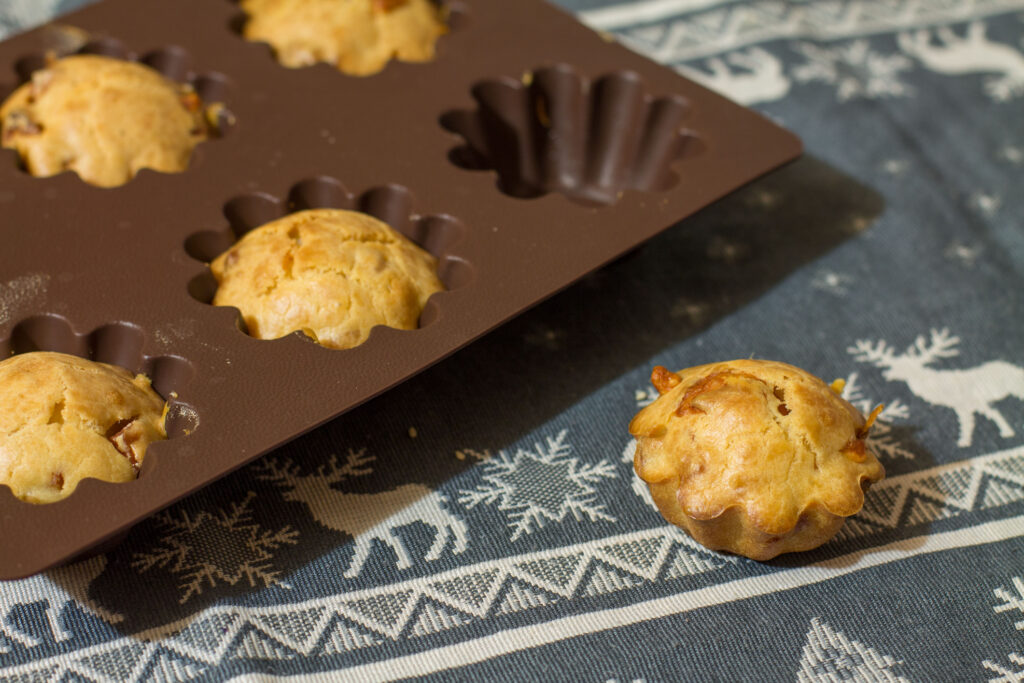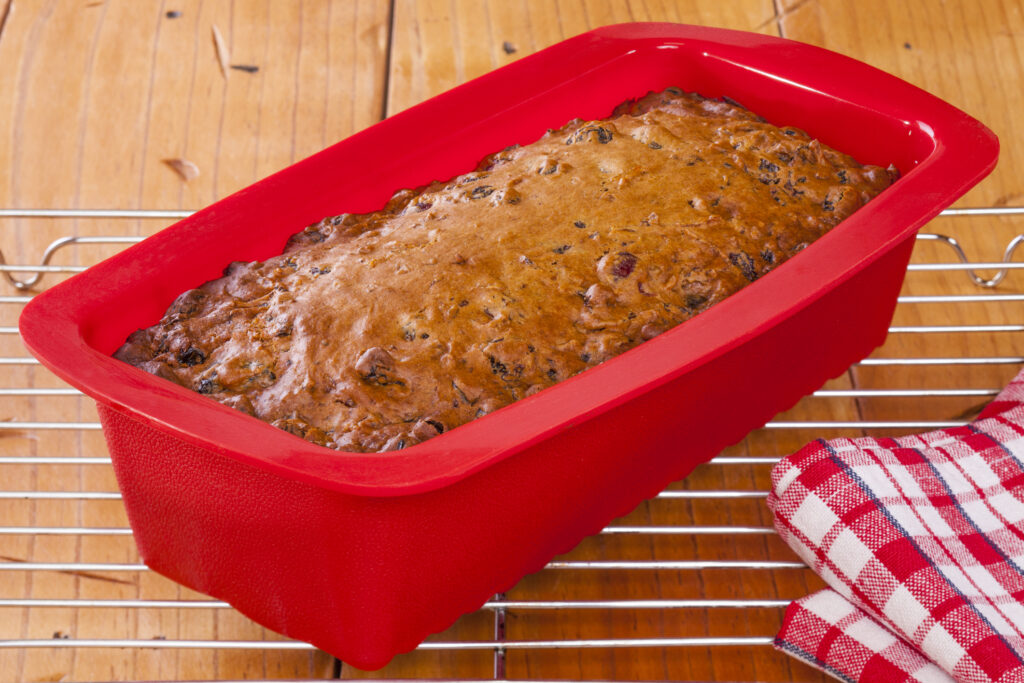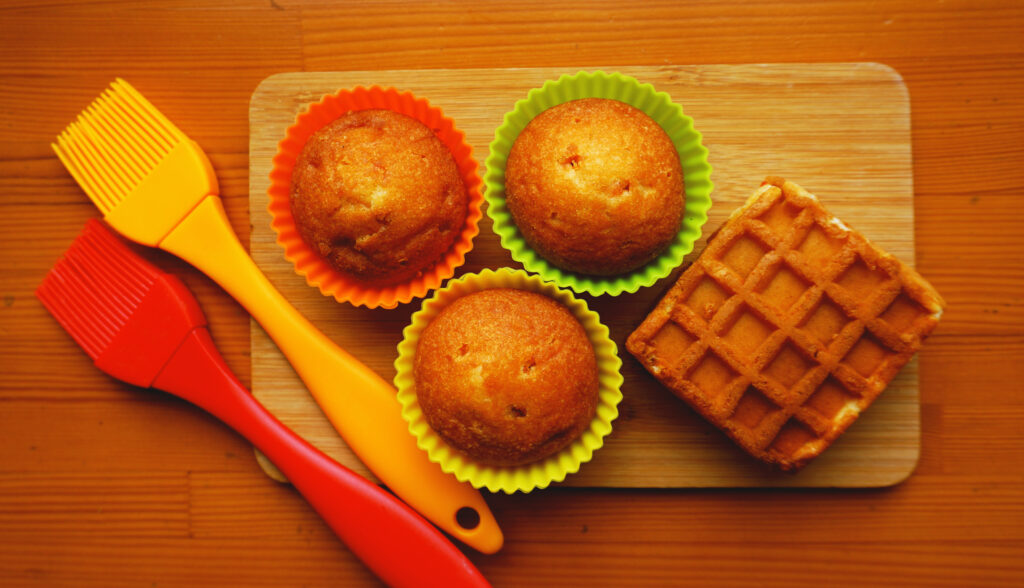==================
Affiliate Statement
Best Baking Tips is supported by our audience. When you purchase through one of our links, we may earn a small affiliate commission. As an Amazon Associate I earn from qualifying purchases. Your cost is not affected.
==================
Is silicone bakeware safe to use? Due to its non-stick surface and adaptability, silicone bakeware has gained popularity among amateur and expert bakers and chefs. However, many people are left wondering if it is safe to use silicone bakeware in light of increasing concerns about the safety of certain cookware materials. The good news is that when used correctly, silicone bakeware poses no health risks. Silicone is a non-toxic, heat-resistant material that won’t leach chemicals into your food even when heated to high temperatures. Like any other type of cookware, silicone bakeware has advantages and disadvantages, and it’s essential to know how to maintain it correctly to get the most out of it. In this piece, we will discuss the security of silicone bakeware and offer advice on how to use and care for it.
Is Silicone Bakeware Safe For Baking?
Is silicone bakeware safe for food preparation? The short answer to that is yes. Bakers all over the world today use it to create some of the tastiest treats in the kitchen. They choose it over other cooking utensils made of different materials. That would be because it prevents food from sticking to the cookware. Aside from that, it’s the kind of tool that burns slowly. Silicone can withstand very high heat. When it freezes, there is no problem. So it is apparent why many home and professional kitchens have them. Like in using any cooking utensils, there are concerns about using silicone products. The synthetic material resembles plastic but is different from it. Its attributes are like natural rubber, yet it isn’t the same. Thus knowing more about it is reasonable. This post explains the use of silicone in baking and discusses the substance. Also included are safety tips for using it. Keep reading for more details.
How Is Silicone Bakeware Safe For Cooking?
People use this inorganic and synthetic polymer because it doesn’t cause health issues. It is in many ovenware products due to its safety features. The elastomer has food-grade applications or is usable for cooking only since it is inert. It means it doesn’t have anything that would transfer or contaminate food. Other materials don’t react to it when heated, and heating it won’t cause the release of toxins too. Thus it can come in contact with food and isn’t risky for baking.

Labs create it to contain repeating carbon, silicon, and oxygen atoms. Yet it’s a stable compound that even the FDA approved for cooking. So it’s no wonder why there are many products made from it in the market today. As of now, there are no serious health hazards linked to it. Even if some people claimed to have had adverse reactions to the polymer, there are only a few cases of such things. None of the issues relate to poisoning after consuming food cooked in silicone.
Why Is Silicone Bakeware Safe For The Environment?
Is silicone bakeware eco-friendly? Yes, it is. It’s also why folks buy and use it for food preparation. Aside from its long-lasting nature, producing it does not involve using crude oil. Unlike when manufacturing plastic, natural gas is required for industrial processes. According to some research, about 8 to 10% of the oil stock goes to creating plastic products. Take note that obtaining oil or gas often harms marine ecosystems and more. Thus using silicone helps in preventing environmental issues.

Compared to their plastic counterparts, silicone cookware items are more durable. Does silicone compost? No, it doesn’t since it’s not biodegradable. Yet it does break down after hundreds of years. That’s a good thing because, in that way, it lasts longer and becomes recyclable. Silicone cooking utensils often carry on for decades. Even if there were a need to dispose of them, there would only be a few problems. Recycling companies often accept these things. That is to break them down and mix them with new batches. Incinerating them is an option too. This elastomer does not produce toxic chemicals after burning. So if you’re asking, “Is silicone bakeware eco-friendly?” Then you should know up front that it is helpful to the environment.
Is Silicone Bakeware Safe For Everyday Use?
Whether you’re a hobbyist or a professional chef, using silicone is a good idea. Put synthetic polymer versions of baking pans and molds for baking pastries. You can even try silicone trays for holding liquid or freezing baked goods. It’s because these materials are elastomers that can withstand high temperatures. It and the food you’re cooking won’t burn even if it reaches about 450 Fahrenheit or 232 Celcius. It won’t become brittle and break at -80 Fahrenheit or -62 Celcius. Thus putting it inside an oven and in the freezer for some time will be okay. Spoons, spatulas, egg beaters, tongs, and baking brushes made of silicone are worth it too. They can withstand heat and are durable enough to use many times. So modern kitchens often have them. Being insulators, they are also excellent to hold while cooking. Using them means having safety from burns too. They make fine cooking utensils for a long time with that and their durability. In that way, we can consider them worthy investments.
Video Credit: @IsitWorthit1
Silicone Cookware Usage
Going for bakeware that uses synthetic materials is like buying conventional cooking utensils. It’s that you know you’re getting things that have different physical attributes. Is silicone bakeware safe to hold? As mentioned, it has heat-resistant properties. But, as for its hardness, products with the said synthetic polymer vary. Compared to metallic ones, they are often more malleable and softer. That is regardless of their shape and size. Yet this doesn’t mean there’s no trouble breaking them. Some may be very soft, while others are thick and have medium to tough hardness. Hence, they are trustworthy products too.
In Baking Or Cooking
Although silicone products are non-stick, many still spray cooking oil or grease. It’s only that it makes cleaning after baking very easy. Spraying or greasing prevents baked goods from adhering to the side of the pan or mold. Many even use parchment paper to avoid sticky issues. With these things in mind, you may wonder, “Is silicone bakeware safe for baking?” Yes, it works like metal, glass, and ceramic baking utensils.

Often, silicone oven trays or baking molds take time to heat up. As said, the synthetic polymer resists heat. Follow the cooking instructions and try to research to figure out how long it takes to bake. In this way, you will indeed have suitable baked goods when using silicone containers.
Cleaning
After usage, people must clean and store them to preserve their positive qualities. Does silicone compost at all? Like plastic, people estimate it to deteriorate after 400 to 500 years. Yet, unlike polyethylene and other plastics, it doesn’t often break into smaller pieces. With the right care, passing these utensils on from one generation to another is possible. Yet, more often than not, owners dispose of them because the markings on them fade. So how long does silicone bakeware last in kitchens? Usually, after around 2 to 4 years of constant food preparation, people replace them.
Usually, cleaning is possible through an automatic dishwasher. If not that, hand washing with soapy water works too. Yet, to remove tough stains, it may be necessary to soak the silicone items in warm water first. But bear in mind that it is vital to use a non-abrasive sponge only while washing too. Scrubbing off food and debris with a smooth sponge prevents scratching surfaces.
Is Silicone Bakeware Safe To Recommend?
Once again, the answer is an absolute and resounding yes. After all, this type of cookware has many positive attributes. Compared to its disadvantages, its strengths make it worth purchasing. Yet it pays to know why some folks prefer bakeware made of other materials. That is to make an informed decision when getting items for baking. So please get to know its good and bad sides before anything else.
Delivers The Right Shape Of Food
Because food doesn’t stick to it, baking turns perfect. This means the shape you put in the oven comes out as it is. Even without greasing the silicone mold, the likelihood of having shaped food is high. The synthetic material is flexible and easy to turn inside out when needed. Thus baking becomes less tiresome, and frustration gets avoided when using silicone.
Easy To Clean and Store
Is silicone bakeware safe for cleaning and storing? Without a doubt, it is fine to clean and reuse. Soap and water are all you need to have food and debris removed. No chemical comes from it and attaches to the skin. Plus, it resists intense heat, cold, and moisture. Storing it is very easy. Also, in most cases, silicone is malleable, like rubber. Keeping it in different compartments becomes convenient since it can occupy less space.
How long does silicone bakeware last when clean and stored well? Depending on the usage, it’s likely to remain useful for a few years to a whole decade. What affects its longevity is the way it’s used. Cleaning it with soap and water after use can do a lot of help in keeping it reusable. It’s the same with soaking it in warm liquid and scrubbing things off. Still, to avoid it from getting smelly, submerge it in a mixture of vinegar and water. So it helps with the cooking and is to tidy up.
Is Silicone Bakeware Safe? Absolutely.
Yes, it’s safe to use and an excellent alternative to traditional metal, ceramic, and glass pans. It can withstand very high temperatures and freezing even if it is malleable and soft. Its non-stick and non-toxic properties make it safe for cooking and serving food. Most people don’t encounter problems using it, so it’s likely risk-free. Plus, it’s safe for the environment since it’s long-lasting and doesn’t emit toxins. So it is an excellent choice for a practical and eco-friendly type of baking. Have you tried using this silicone cookware? What do you think? Please send us a comment to share your thoughts. Thanks for reading.
FAQs
Is it okay to use plastic utensils in the oven?
Absolutely! Silicone cookware poses no significant health risks when used as intended. Silicone’s non-toxic and heat-resistant properties mean it can endure high temperatures without releasing any harmful chemicals into your food, making it a desirable material for use in the kitchen. As a result, you can confidently use it in your oven to bake delicious treats like cakes, cupcakes, and cookies.
In the world of bakeware, how does silicone stack up against the competition?
Silicone is one of the most widely used options because of its many advantages in the kitchen. To give just a few examples, it is non-stick, bendable, and resistant to breaking or warping. This ensures that baked products can be released from the pan without difficulty and that the pan will last for many uses to come. The browning and crispiness of your baked products may improve, depending on the type of metal bakeware you use and the recipe.
Do I need to take any special care with plastic bakeware?
However, there are a few things to bear in mind despite silicone bakeware being typically very simple to use and clean. The first rule of using and washing silicone bakeware is always to refer to the product’s manual. You’ll be using it properly and getting the most out of it if you do. Be careful not to scratch the pan’s interior with any pointed implements. This could contribute to the silicone becoming brittle and losing its non-stick properties. Lastly, always use a baking rack to keep your silicone pans in place while in the oven, and let them cool completely before cleaning them with a gentle detergent and warm water. Cracks or other indications of wear and tear indicate that the bakeware needs to be replaced.




